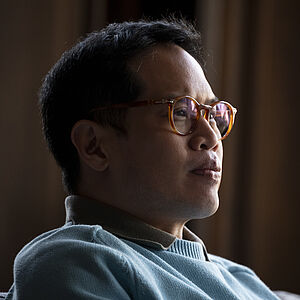
Andrew Hui, PhD
Associate Professor of Humanities
Yale-NUS College, Singapore
Born in 1980 in London
Studied Liberal Arts and Comparative Literature at St. John’s College, Annapolis, Yale Divinity School, the Scuola Normale Superiore, and Princeton University
Project
Confucius the Stoic: The Encounter between Chinese and Western Philosophy in the Global Renaissance
In a 1595 letter, the Jesuit missionary Matteo Ricci wrote that in their teachings and morals, the works of ancient Chinese philosophers were like “another Seneca.” My project, “Confucius the Stoic,” is about the encounter between two cultures – Europe and China – and how this encounter was made possible by a small group of highly erudite religious men. It occurred at the pivotal moment when Renaissance humanism was giving way to the early modern age of science. The Jesuits – a new Catholic order founded to combat the Reformation within Europe and to evangelize the world – constructed the idea of a global humanism, and this construction was made possible, I argue, through the retrieval of the texts of antiquity, both Western and Eastern.I will investigate how Christian missionaries retrieved the texts of Western classical antiquity to explain Confucianism to Europe and conversely retrieved the texts of Confucianism to explain Christianity to China. In seeking to find equivalences between Greco-Roman and Chinese antiquities, the Jesuits translated Euclid, Epictetus, and Aristotle into classical Chinese and brought astronomical and cartographic knowledge into the imperial court. In turn, in their field reports and rendering of the Confucian Four Books into Latin, the missionaries saw the Chinese sharing the same idea of the “natural light of reason” as the ancient Stoics. Eventually, the work of the Jesuits fueled the imagination of European thinkers such as John Webb, Athanasius Kircher, and Leibniz. Thus, this episode in cultural encounters prompts us to re-examine the construction of “East” versus “West” in the formative age of global modernity.
Recommended Reading
Hui, Andrew. The Poetics of Ruins in Renaissance Literature. New York: Fordham University Press, 2016.
—. A Theory of the Aphorism from Confucius to Twitter Princeton, NJ: Princeton University Press, 2019.
—. “Dreams of the Universal Library.” Critical Inquiry 48, no. 3 (2022): 522–548.
Colloquium, 13.02.2024
Confucius the Stoic: How to Make Comparisons in the Global Renaissance
Matteo Ricci once made a very interesting comparison. The celebrated Jesuit missionary to China said in a letter to Claudio Acquaviva, his superior general in Rome: “In morals he is another Seneca [è nel morale un altro Seneca].” The subject of this phrase can only be assumed to be Confucius. This philosophical equivalence—the founder of Chinese philosophy as “un altro Seneca”— raises all sorts of questions about cross-cultural understanding. What were the philosophical presuppositions that made this comparison possible? Is this conjunction between the two thinkers a convergence or correspondence? What are the gradations of similitude and differences? To use a Stoic image—what are the hidden nodes of “cosmic sympathy” (συμπάθεια) between these two ontologies? Or to use a term from Chinese cosmology—what is the ganying (感應), the “correlative resonance” that pulsates between these two entities?
My Wiko colloquium will present Ricci as a classicist, or better, a hybrid bicultural classicist who is deeply immersed in the Greek and Roman traditions as well as the Chinese canon. He introduces the ancient philosophy of the West to his hosts by finding equivalences with ancient Chinese philosophy and in turn introduces the ancient Chinese philosophy to Rome by finding grounds of commonality with Western philosophy. My argument is that Ricci is able to negotiate these two complex cultural spheres by making the ancient philosophies of both the West and the East the prolegomena of his central mission of evangelization. Ricci’s lifelong project was to forge these equivalences, a project that is a remarkable moment in the encounter between “East” and “West” in early modernity. In this early modern exchange, there emerged a new global matrix of cross-cultural knowledge in which the categories of “China,” “West,” “antiquity,” and “reason” intersected.
Publications from the Fellow Library
Hui, Andrew (Princeton, 2025)
The study : the inner life of Renaissance libraries
Hui, Andrew (Chicago, Ill., 2022)
Dreams of the universal library
Hui, Andrew (Princeton, 2019)
A theory of the aphorism : from Confucius to Twitter
Hui, Andrew (New York, 2016)
The poetics of ruins in Renaissance literature Verbal arts
Hui, Andrew (Cambridge, Mass., 2015)
Wordless texts, empty hands : the metaphysics and materiality of scriptures in Journey to the West



